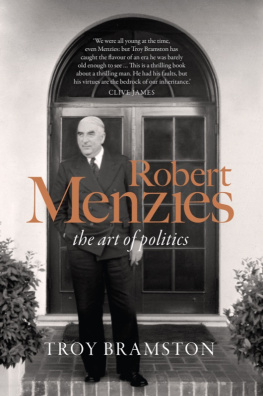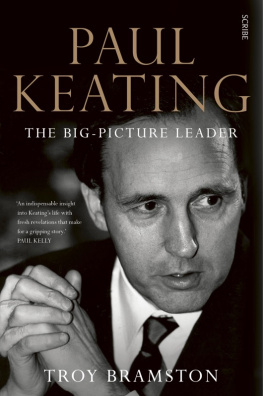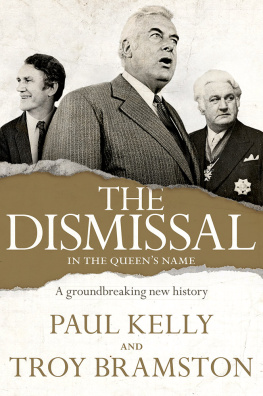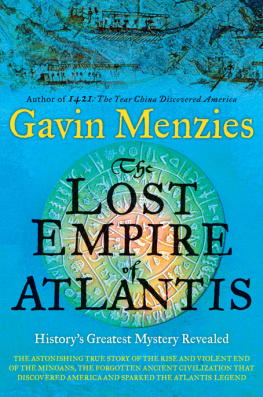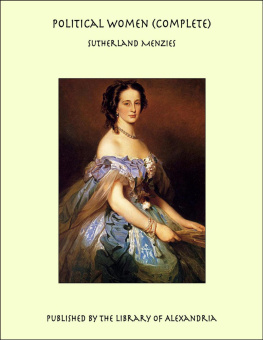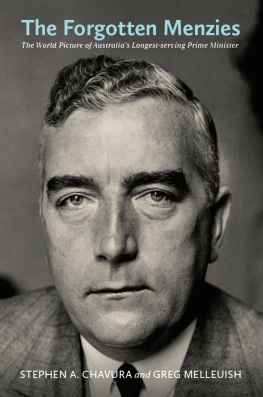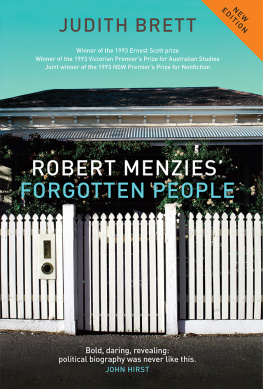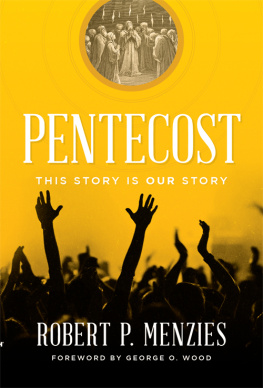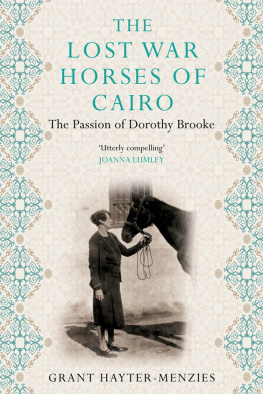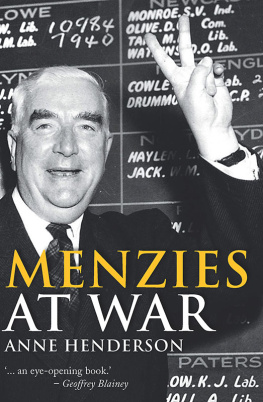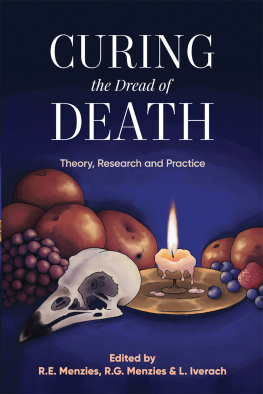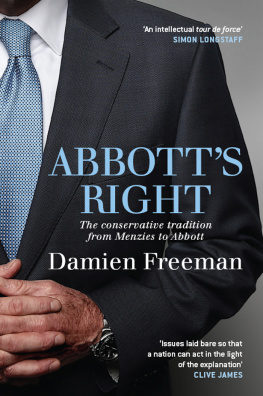
ROBERT MENZIES
TROY BRAMSTON has been a senior writer and columnist with The Australian newspaper, and a contributor to Sky News, since 2011. He was previously a columnist with The Sunday Telegraph .
Troy is the author or editor of nine books, including Paul Keating: the big-picture leader (2016), and, co-authored with Paul Kelly, The Dismissal: in the Queens name (2015).
He was the co-winner of the Australian Book Industry Award for The Dismissal . His biography of Paul Keating was a finalist for the Walkley Book Award, shortlisted for the National Biography Award, and longlisted for the Australian Book Industry Award. He was awarded the Centenary Medal in 2001.
Troy has worked as a policy and political adviser, and speechwriter, in government, opposition, and the private sector. He lives in Sydney with his wife, Nicky, and two children, Madison and Angus.
Scribe Publications
1820 Edward St, Brunswick, Victoria 3056, Australia
2 John St, Clerkenwell, London, WC1N 2ES, United Kingdom
3754 Pleasant Ave, Suite 100, Minneapolis, Minnesota 55409, USA
First published by Scribe 2019
Copyright Troy Bramston 2019
All rights reserved. Without limiting the rights under copyright reserved above, no part of this publication may be reproduced, stored in or introduced into a retrieval system, or transmitted, in any form or by any means (electronic, mechanical, photocopying, recording or otherwise) without the prior written permission of the publishers of this book.
9781925713671 (Australian edition)
9781912854561 (UK edition)
9781950354009 (US edition)
9781925693508 (e-book)
Catalogue records for this book are available from the National Library of Australia and the British Library.
scribepublications.com.au
scribepublications.co.uk
scribepublications.com
To Paul Kelly, colleague and friend,
who set the standard for writing about Australian politics
Contents
Preface:
Prologue:
PART I
The Boy from Jeparit: 18941926
PART II
Rise, Fall, and Redemption: 192649
PART III
The Colossus: 194966
PART IV
Afternoon Light: 196678
Epilogue:
Politics is both a fine art and an inexact science. We have concentrated upon its scientific aspects the measurement and estimation of economic trends, the organisation of finance, the devising of plans for social security, the discovery of what to do. We have neglected it as an art, the delineating and practice of how and when to do these things and, above all, how to persuade a self-governing people to accept and loyally observe them. This neglect is of crucial importance, for I am prepared to assert that it is only if the art of politics succeeds that the science of politics will be efficiently studied and mastered.
Robert Menzies, The New York Times Magazine , 28 November 1948
PREFACE
Robert Menzies Unplugged
IN May 1972, journalist Frances McNicoll began a series of interviews with Robert Menzies at his postprime ministerial office, located on the 14th floor at 95 Collins Street, Melbourne. These extraordinary interviews have never been fully revealed until now. Menzies talked at length about his upbringing, reflected on political events, policies, and personalities, offered political lessons drawn from his experience, and candidly assessed his prime ministerial successors. These interviews eight conducted in May 1972 and another in December 1973 are of historical significance. They show Menzies like never before. He is surprisingly frank, offering unvarnished thoughts about all manner of subjects, events, and people in the twilight of his life. These interviews will amaze and astonish readers, provide new insights into Menzies life and legacy, and add immeasurably to our knowledge of our political history.
A fortnight after Menzies death in May 1978, McNicoll wrote an article for The Bulletin magazine that disclosed the former prime ministers poor opinion of Harold Holt, John Gorton, and Billy McMahon. These comments from Menzies were drawn from the interviews, but they represented only a fraction of his remarks recorded on reel-to-reel tapes and later transcribed. Another article, for The Australian Womens Weekly , divulging further comments by Menzies from the interviews, was published in July 1982. But this vast trove of interviews has not been completely utilised. Moreover, McNicolls correspondence, notes, and research with and about Menzies, his family, colleagues, and staff have not all previously been made public. Ownership of the interviews transferred to the Menzies Foundation in the early 1990s, with restricted access. They have been made available for this book by the Menzies Foundation, and with the approval of the Menzies family.
McNicoll married Vice Admiral Sir Alan McNicoll, who knew many people in politics, the public service, and the media, in 1957. (Journalist David McNicoll was her brother-in-law.) In 1959, she met Menzies at a dinner party, and they became friendly. She subsequently worked for The Economist magazine in London and in Australia, and in 1969 was commissioned by Menzies to write his official biography. In 1972, this arrangement was confirmed, and McNicoll was given access to Menzies papers at the National Library of Australia. Menzies also stipulated in his will that McNicoll was to have exclusive access to the papers for the first three years after his death, and the family extended this for a further year, until 1982. This gave her sole access to his papers for ten years. Menzies refused requests for interviews and access to his papers by prospective biographers; understandably, they saw little point in competing with McNicoll, and their books were not written.
She conducted considerable research, but never managed to produce more than a few scraps of handwritten notes and what seems to be one typescript draft chapter. Her papers, also at the National Library of Australia, are a mess. It is a tragic story. McNicoll was evidently overwhelmed by the task, and the book never appeared. The family gave up on me, she claimed in 1991. They wouldnt give me the papers anymore. I gave up in high disgust because Id done a lot of work on it. She died in 1993.
By 1983, the Menzies family had indeed become concerned about the progress of the biography. So had publisher William Collins. Repeated reassurances from McNicoll, who revelled in her status as official biographer, were unconvincing. McNicoll was awarded multiple grants worth $10,000 about $70,000 in todays value by the Australia Council to write the book. The Menzies papers had been opened to the public in 1982, and two years later, the Menzies family agreed with Melbourne University Press that academic Dr Allan Martin be commissioned to write the biography. Martins book was expected to be published in 1987. However, he said it was not official, and assured readers that his independence was absolute. The first volume, Robert Menzies: a life , was published in 1993, and the second in 1999. Martin did not use McNicolls interviews with Menzies. Nor did he delve far into her papers. Martin did not interview Menzies or McNicoll.
Journalist Allan Dawes also began a biography of Menzies. But that manuscript was left incomplete in the 1950s. I have also made use of Dawes manuscript and his interviews with Menzies. Another biographer, Ronald Seth, also interviewed Menzies for his short biography, R.G. Menzies , published in 1960. But Menzies had a poor opinion of Seths book. The only other biography published in Menzies lifetime, Kevin Perkins Menzies: the last of the Queens men , was thought by the subject to be littered with errors. Percy Joske, a friend and colleague at both the Bar and in parliament, curiously characterised his biography of Menzies as an informal memoir. Cameron Hazlehursts Menzies Observed stressed that it was biographical but not a biography.
Next page
